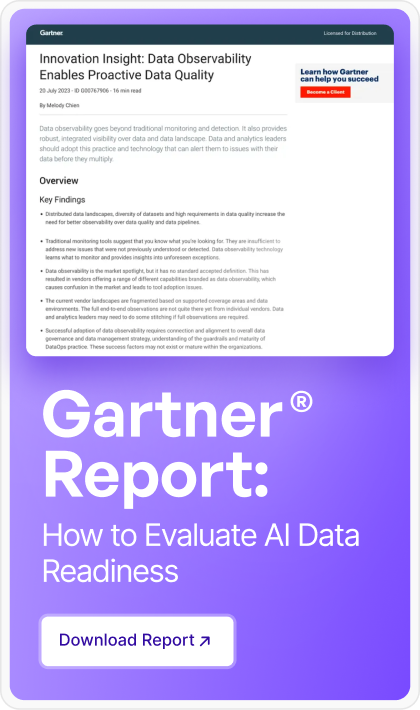Imagine inadequate data quality quietly draining your company's earnings like an invisible leak. Picture running a thriving online retailer, expanding your inventory to meet growing customer demand. Behind the scenes, data errors such as incorrect customer addresses, inventory mismatches, and faulty sales forecasts are steadily invading. Minor errors like late deliveries, overstocking expenses, and unhappy consumers can pile into significant financial losses. Sound familiar? Many companies nowadays live in this situation.
A Gartner Survey indicates that organizations lose an average of $12.9 million in a year due to poor data quality costs. These hidden expenses often remain unnoticed until they significantly compromise business operations. However, data quality assurance (DQA) offers an effective solution. When implemented effectively, DQA stops mistakes in its tracks and proactively prevents them, thereby generally releasing operational efficiency and savings.
Understanding these expenses and how to invest in data quality can help your company transform data from a possible risk into its most significant advantage.
What is Data Quality Assurance?
Data quality assurance establishes rigorous standards to ensure data meets defined quality criteria. Using data profiling, it identifies anomalies, removes outdated information, and refines data to be accurate and reliable. This approach allows enterprises to trust their data for modeling and analysis, ensuring it serves intended purposes effectively.
For example, incomplete patient records could lead to incorrect treatment plans, posing risks to patient health. With thorough data quality assurance, patient information is kept complete and current, significantly enhancing patient safety and health outcomes.
The True Cost of Poor Data Quality
Bad data quality has financial consequences that go beyond a few errors in a spreadsheet. It starts a domino effect that affects several aspects of a company, such as draining earnings and hindering expansion. Let's investigate some of the most significant expenses related to inadequate data quality:
Operational inefficiencies
Data errors cause repetitive tasks, corrections, and manual reprocessing, increasing labor and operating expenses. This time-consuming process, which directly affects production, eventually costs companies millions of dollars.
Lost revenue opportunities
Businesses depend on correct data for strategic decisions. Data quality impairment could result in lost revenue. For instance, incorrect consumer insights and inadequate market analysis can lead to lost sales and ineffective marketing strategies.
Compliance penalties
In industries requiring rigorous regulatory compliance, inadequate data quality can lead to fines and monetary penalties. For instance, Citibank's $400 million fine was issued by the Office of the Comptroller of the Currency in 2020 for neglecting to create appropriate systems of risk management and data governance. This financial loss highlights the need for data quality as a compliance requirement rather than only a functional one.
Inaccurate decision-making
Business decisions are only as accurate as the data upon which they rely. Inaccurate or insufficient data can lead to poor market strategy, ineffective resource allocation, and mistaken judgments. This directly affects not only the expansion of a business but also the bottom line.
Customer churn
Customer unhappiness might result directly from insufficient data. For example, inaccurate billing or contact details can irritate consumers and cause them to go to rivals.
5 Ways Data Quality Assurance Can Save Your Business Money
Though it may appear like an extra expense, data quality assurance (DQA) is a resourceful investment with significant financial returns. Data quality assurance is applying technology and procedures that guarantee consistency, accuracy, and dependability. Data quality should be prioritized so companies can prevent costly mistakes and improve running effectiveness.
Here's how data quality assurance may save your company money:
1. Preventing costly errors
Finding and fixing data mistakes before they cause more major, costly issues depends on data quality assurance. DQA (Data Quality Assessment) procedures help businesses instantly check data accuracy and prevent mistakes from spreading through several company operations. Early detection of billing issues helps avoid customer conflicts and costly refunds. Using a proactive approach to data quality, little data problems are controlled, and companies are assisted in saving money and preserving seamless operations free from severe financial pressures.
2. Enhancing decision-making
Accurate data guarantees better decision-making, therefore guiding the distribution of resources and lowering the financial risks. For example, exact demand forecasts made possible by trustworthy data help companies avoid overproduction or stockouts, immediately saving costs.
3. Reducing operational costs
Automating data quality tasks, including validation and data cleansing, lessens the need for human involvement and related labor expenses. According to a study by McKinsey, data-driven companies are 23 times more likely to attract consumers and 19 times more likely to be profitable. Investing in automated data quality systems helps businesses reduce running costs and free their staff for strategic projects.
4. Ensuring data compliance
Data compliance depends on quality data, particularly in sectors with tight legal standards. Ensuring data governance and accuracy helps companies stay free from the heavy fines and legal expenses related to non-compliance.
5. Boosting customer retention
Accurate consumer data helps businesses offer a seamless and customized customer experience, lowering turnover and raising client lifetime value. Good data makes this easier and directly helps to boost income and expense savings from keeping current clients.
Case Study: Acceldata Working With Global Information Services Provider
Given the complexity of the data environment, a worldwide information services company found considerable difficulty preserving data quality. Maintaining data accuracy becomes difficult for the supplier, affecting operational effectiveness and client confidence. A strong data observability system could instantly monitor and control data quality. Using Acceldata's platform, which provides an insightful analysis of data pipeline health, the business can find and fix data problems early on. Along with increasing data accuracy, this deployment raised the operational efficiency of the business, saving significant costs.
Investing in Data Quality for Long-Term Cost Savings
Bad data quality has instantaneous and broad effects. Companies pay a heavy cost for ignoring data quality, from operational inefficiencies and lost income to compliance fines and brand damage. Hence, applying data quality assurance is a defensive tactic and a proactive investment that can result in notable cost savings, streamlining processes, and improved decision-making.
Now is the moment to make data quality a strategic advantage. Investing in data quality assurance will open fresh development prospects and shield your company from the hidden expenses of bad data.
Acceldata ensures the trustworthiness of your critical data assets by measuring their quality against established rules and business policies. It identifies and addresses data quality issues directly at the source, detecting anomalies that impact data reliability. With defined quality thresholds, Acceldata can quarantine data, pause or rerun data pipelines, and take corrective actions as needed. This process not only helps identify root causes but also allows businesses to prioritize which data quality issues to resolve first.
Visit Acceldata's website and set up a demo to investigate how their technology might assist you in applying a thorough data quality assurance plan. Early action will help your company protect its money, increase profitability, and create a basis for the next growth.
Summary
Poor data quality could cause companies significant financial losses, including operational inefficiencies, lost income, and compliance fines. Data quality assurance is a proactive approach that reduces costly mistakes, improves decision-making, simplifies processes, and raises return on investment. Acceldata's success stories show that companies may save significant costs by using explicit data quality standards, automating data operations, and using artificial intelligence for anomaly identification.








.png)








.webp)
.webp)


